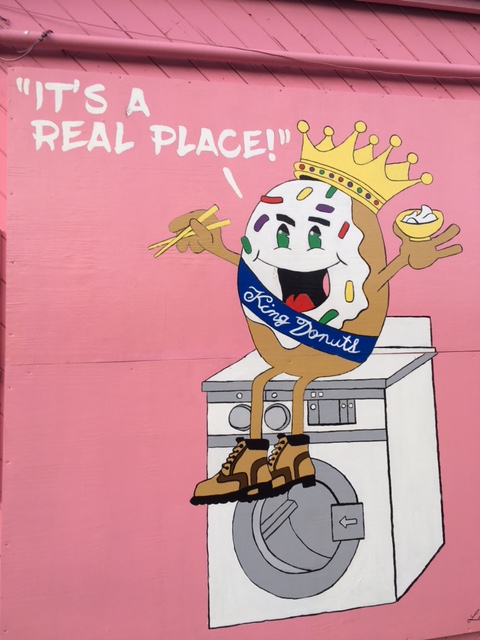By Assunta Ng
NORTHWEST ASIAN WEEKLY

King Donuts storefront (Photo by John Liu/NWAW)
The contrasting emotions between the two generations of King Donuts, a family business, couldn’t be more obvious at its farewell party last weekend.
Located at 9232 Rainier Avenue South, King Donuts announced early this year that the husband and wife owners, Chea Pol and Heng Hay, would be retiring after nearly 30 years in business. Through Facebook, the Hays invited community members to their closing party with pizzas and goodies on Dec. 17.
Fans raved about King Donuts online as the best donuts in the world. Over the years, the couple added teriyaki to the menu and more than 20 laundry machines (at the back of the restaurant). Originally from Cambodia, Pol and Hay escaped genocide to come to America in 1981.
How much did the closing have to do with the owners being attacked in the business parking lot last year? They were robbed, beaten, and severely injured. The suspect was later caught. And what does the closing tell you about immigrant family businesses? Why didn’t the owners pass on King Donuts to the next generation?
Why didn’t the Hays sell their business?

From left: Chea Pol, Davie, Sokha, Heng Hay, and Channa Hay (Photo by John Liu/NWAW)
The two generations
Pol told the Northwest Asian Weekly, “I am sad (about the closing).” And she has no future plans. “I don’t know what I will do yet.” The last day of business was on Dec. 20.
The landlord would have asked for a lot more money if the Hays wanted to continue the lease after it expired. So the lease expired and potential buyers backed out.
However, Pol’s three children didn’t appear to be sad. Their clients have become their friends. People continued to show up at the door. The lines kept growing around the food table. Pizza boxes for hundreds of guests piled high on the counter. It didn’t matter that the place needed paint and repairs. It didn’t matter that the place was crowded, and it was literally standing room only. Customers took pictures with the family. Some performed music to entertain guests. People thanked the owners and hugged each other.
Quite a few strangers, like me, were curious about the event. Once we walked in, we felt like part of a family. It was one big, welcoming community gathering.
Sokha, Pol’s younger daughter, who works for Morgan Stanley, was laughing and hugging friends of all ages and races. “I didn’t know so many people would come,” she said. “Many of them I have not seen for a long time.”
Channa, Pol’s oldest daughter was busy, greeting friends too. There was no sign of grief on her face. Instead, she looked relaxed and relieved.
“(King Donuts) is my parents’ passion, not mine,” said Channa. When asked if she felt sad that the business had no buyer, she replied, “We have to move on.”
Channa was pursuing her master’s degree in health administration during her parents’ robbery. She disrupted her education to help them run their business. She and her two other siblings had worked in the shop since they were 11 and 12 years old.
The shop has raised a family of three kids, all educated, including a son, Davie, who has another job.

King Donuts logo (Photo by John Liu/NWAW)
Different dreams
Despite what skeptics believe that immigrants mooch off welfare, Pol and Hay relied on themselves through hard work, determination, and endurance.
They have fulfilled the American Dream by starting their own business and raising a family successfully. Instead of working for others, they became self-employed.
Like many immigrant family businesses in labor-intensive trades such as restaurants, laundromats, cleaning, and owning motels, their kids were part of the labor pool. That’s the secret of success for immigrant businesses. The business also serves as a function to unite the family so it can strive through sacrifice and hard work.
Since the children grew up in America, they have their own dreams, different from their parents. Once they are ready, they can spread their wings and fly with the knowledge and skills acquired in their new country.
Most are not keen on repeating the long hours and laborious demand in running their parents’ business. Unlike their parents, the second-generation has choices — beyond their imaginations. They possess the freedom and flexibility to explore endless possibilities and enjoy a decent living, unrestricted by language and cultural barriers. That’s another version of the American Dream.
Knowing your own passion is a path to happiness. Author Gretchen Rubin wrote, “One of the greatest supports to a person’s happiness is passion.” Discontinuing the parents’ business was simply a natural evolution, and a sign of progress for the next Hay generation. They aim to work for fulfillment and positive contribution, not for survival like their parents.
As author Joe Robinson wrote in the Huffington Post, it is important not to just making a living, but how to do the living we are making.
Assunta can be reached at assunta@nwasianweekly.com.



